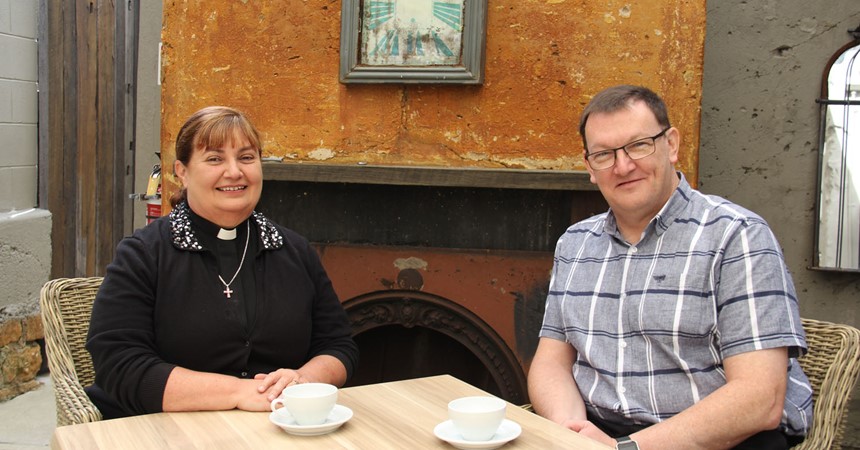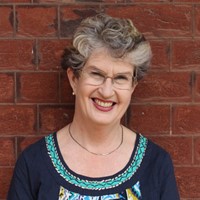The two priests’ stories are quite different. Katherine is Newcastle-born and bred and grew up in rectories, as one of two daughters of Fr Wilf Redden. Her father, one time parish priest in Gosford, was a good friend of Emeritus Bishop Michael Malone. In fact, after her ordination, Bishop Michael asked for her priestly blessing. Katherine had grandparents who were lay preachers in the Methodist Church so ministry is in her genes.
Andrew grew up in Casino, in the Diocese of Lismore, and initially he pursued a career in banking and finance for some years. He is the eldest of seven children and was raised in a family for whom faith was integral. He had been a student for the priesthood for Lismore Diocese but did not complete formation. Years later, having made a connection with the Diocese of Maitland-Newcastle, he entered St Patrick’s Seminary at Manly and was ordained here in 2007.
It was a significant moment for Katherine when she told her father she believed she might have a call to priesthood. He had been opposed to the ordination of women, until “a profound experience of the Holy Spirit” led him to a new understanding. His advice was to “test the call, pray about it ‒and do something else first”. The ‘something else’ was the study of history, leading to a thesis exploring groups of women in the Anglican Church between the 1960s and 1990s, a time of profound change.
Katherine married David, a teacher, and by the time she began studies for priesthood at St John’s College, Morpeth, their son Thomas and daughter Elizabeth had arrived. Both are now young adults. She recalls that the seminary regime was based on a Benedictine model, incorporating prayer, study and manual work, including clearing lantana on the property. “It was challenging at times with small children in tow!”
Andrew, of course, doesn’t have the family responsibilities and commitments Katherine has, although being so far away from his parents and extended family has its own cost. There is also a level of responsibility for the priests with whom he shares the presbytery at Hamilton and as Vicar General (a role separate from that of Dean) he has a pastoral role amongst the clergy.
Katherine was ordained in 2002 and became Dean of Christ Church Cathedral in 2017. She served in the parishes of Morpeth and Singleton, and then as rector in Rutherford and Cardiff. Regional parishes have traditionally been more ecumenically-minded, given that those worshipping in different churches tend to know each other and come together easily. Both Katherine and Andrew ministered in Singleton, although not concurrently, and each can recall times when they were present sacramentally to a congregation other than their own. “You just do it and it creates no fuss,” said Andrew.
Since 2008 there has been a Tri-Diocesan Covenant that links the Anglican Diocese of Newcastle and the Catholic Dioceses of Broken Bay and Maitland-Newcastle and this has provided further ecumenical opportunities. Traditionally civic occasions have been observed at Christ Church Cathedral – the opening of the Law Term, the Police Remembrance Service, Breast Cancer Awareness Evensong and so on. Services such as these are now being shared between the two cathedrals, and as Andrew says, “We bookend the CBD.”
Katherine adds, “Our working together and sharing a good relationship sends a powerful message to the city that this is what faith is about.”
When Andrew says, “It’s not your church and my church, it’s …” Katherine concludes, “God’s church!”
Both Deans acknowledge how much the local community has suffered because of sexual abuse by clergy and church personnel. Katherine recalls letting Bishop Michael know that she was praying for him and his church as the truth was revealed. Since then, both diocesan communities have learned hard lessons and lived through the Royal Commission into Institutional Responses to Child Sexual Abuse.
Asked what the churches have to offer the broader community today, Andrew recalls participating on ANZAC Day this year. “When we led prayers, the people said ‘Amen’ with conviction, so being there publicly taps into something that’s nascent in the broader community. We still offer something more, that sense of hope…and we can still say ‘Amen’ to that.”
Katherine says, “In a world where hatred and oppression are so often the bywords, the cathedrals are icons of God’s grace and proclaim, in and through the faithful who gather, a different way of being hope for the world, light in the darkness. We call the world to account, we speak out against injustice, we take the side of the marginalised and oppressed and the community gives us that place.
“I think it would be lovely for us, one day, to be able to share fully, sacramentally.”
And then there’s a long and witty Monty Python-inspired dialogue which Katherine refers to as “an excursion into a shared delight”. Not compulsory, but such fun.




























































































